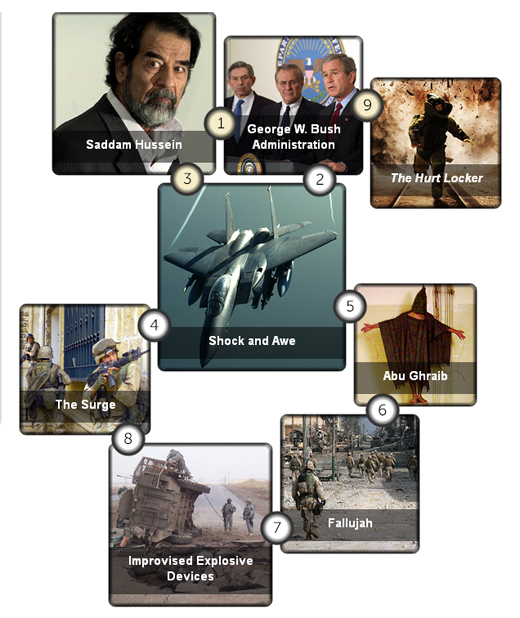Was The World a Better Place With Sadam Hussein
Was The World a Better Place With Sadam Hussein
Mangaloretoday/ mediander
The Iraq War -10th Anniversary: The Iraq War began when American- and British-led coalition forces invaded the country in March 2003 and officially ended in December 2011. Waged on false grounds, it was immensely costly in both lives—nearly 4,500 U.S. service personnel and at least 100,000 Iraqi civilians were killed—and treasure, with total U.S. costs estimated at upwards of $3 trillion. Ten years after the war’s start, we look back at some of its causes and events.

Some observers believe President George W. Bush took office in January 2001 already determined to wage war against Saddam Hussein’s Iraq. Immediately after the September 11, 2001, attacks on the United States, Bush’s cohorts began suggesting (falsely) that Iraq was to blame. By his 2002 State of the Union address, Bush was sounding the alarm that Iraq posed an imminent threat to the world.
Over the next year the president and his advisers, consulting with the British government of Prime Minister Tony Blair, built their case for the forcible overthrow of Saddam’s regime: Iraq, they declared, was developing and stockpiling weapons of mass destruction, in defiance of a U.N. resolution, and was secretly supporting Al Qaeda, the terrorist organization behind the 9/11 attacks. Neither claim would prove true. The invasion of Iraq began on March 19, 2003.
Saddam was indisputably evil, but Bush’s hostility toward him may have had oedipal roots. In 1991 his father, President George H.W. Bush, led an international coalition to evict Saddam’s army from Kuwait, which Iraq had illegally annexed, but decided it had no grounds to enter Iraq and depose Saddam. Did Bush II intend to prove he could accomplish what his father did not?
Courtesy: mediander.com
- Need For ‘Students, Alcohol and Drugs’ survey
- New Synthetic Drugs Trapping Youth
- Mood Modifying Chips - Future of Drug Use
- Ramping up Indo-Bangla border security
- IITM- A premier educational Institution in a forest. What can we learn?
- Former PM, Manmohan Singh: Notable laws passed under his tenure
- Hashish on Ratnagiri Seashore
- The Poor cry out to Us: Do we respond?
- Clandestine Meth Labs Sprouting Across India
- Hydro ganja from Bangkok latest craze among youth in India
- "Memories to Treasure" Dr.Michael Lobo’s new book
- Dominance of Private Universities: Will it make education inaccessible to underprivileged students?
- Monti Phest: A rich heritage of South Canara
- Kashmir Bhavan in Bengaluru: A must visit place
- "MAI and I" Book of Angelic Emotions
- Draupadi Murmu - The New ’President of India’
- Anthony Ashram in the city grows a classic museum
- First College of Fisheries in India - A Golden Jubilarian
- Flushing Meadows - A Vintage Mansion
- The Colonel�s Bequest
- A Mangalorean PM and his RBI Governor Brother: The Extraordinary story of the Benegal Brothers
- There is no higher religion than Truth: Theosophical Society
- L�affaire - Ashu & Yiju of Mangalore
- Mangalore in Kowloon
- 1568 to 2018 AD: 450 years of Christianity in Mangaluru
- Vice President elect Naidu moves on from nadir to zenith, the phenomenal journey
- Embracing the Outdoors: How Heated Jackets Are Revolutionizing Cold Weather Activities
- Efficient and Sustainable Packaging Solutions with FIBCs
- The Hybrid Kilt Revolution | Where Tradition Gets Trendy
- Affordable Elegance | Embrace Style on a Budget with Cheap Kilts
- Unleashing Style and Functionality | Exploring Tactical Kilts
- Mangalore’s Heroic Lady marks 105th Birthday
- Santa the Christmas spirit
- Geriatric care: Mangalore strikes a fine balance
- The Don Who Made Two Empires to Clash
- CHITRAPUR SARASWATS - A Great Kanara Community
- Our new President Ram Nath Kovind’s significant journey to Rashtrapathi Bhavan
- Marriages made in heaven, big fat weddings made in India
- Eid insight - The giver of glad tidings
- CITY INFORMATION
- TRAVEL
- TOURIST INFORMATION
- HEALTH CARE
- MISCELLANEOUS




 Write Comment
Write Comment E-Mail To a Friend
E-Mail To a Friend Facebook
Facebook Twitter
Twitter  Print
Print 


